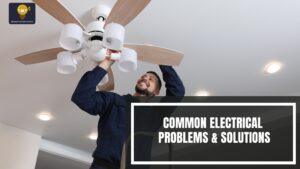Power Your Home Safely: The Ultimate Guide to Electrical Upgrades
Many homes struggle with outdated electrical systems, causing safety and performance issues. Aging wiring or old panels can’t handle modern needs. Rewiring your home ensures a safe, reliable electrical setup. Similarly, an electric panel upgrade boosts capacity and efficiency. These improvements are crucial for today’s households. This blog explores the essentials of updating home electrical systems, drawing from industry insights. We’ll cover why rewiring and panel upgrades matter, their processes, and benefits. Whether you’re modernizing an older home or ensuring safety, this guide helps you stay powered and secure.
Risks of Outdated Home Wiring
Older homes often have wiring that can’t support today’s appliances. Outdated systems lead to frequent outages or flickering lights. More critically, they pose fire risks due to wear and tear. Rewiring your home replaces old wires with modern, safe materials. This reduces hazards and improves reliability. Many homes rely on heavy appliances like air conditioners. Old wiring struggles to keep up, causing inefficiencies. By addressing these issues, homeowners avoid costly repairs. Updating your electrical system ensures safety and functionality. It’s a smart step to protect your home and family from electrical risks.
Signs You Need to Rewire Your Home
How can you tell if your home’s wiring is outdated? Several signs point to the need for rewiring your home. Flickering lights or frequent breaker trips suggest overloaded circuits. Warm or sparking outlets are serious warning signs. Older homes may have knob-and-tube wiring, which is unsafe today. If your home can’t power modern devices, it’s time for action. Additionally, a panel upgrade may be necessary if breakers trip often. Recognizing these signs early prevents safety issues. Taking action promptly ensures your home remains safe and efficient for daily use.
Benefits of Rewiring Your Home
Rewiring your home brings significant advantages for safety and performance. Here are key benefits:
- Enhanced Safety: Reduces fire risks from faulty wiring.
- Improved Efficiency: Supports modern appliances without strain.
- Higher Home Value: Upgraded systems attract buyers.
This process ensures compliance with current electrical codes. It prevents outages, saving time and money. For instance, rewired homes handle devices like chargers or heaters easily. Additionally, it offers peace of mind, knowing your system is reliable. By investing in rewiring the home, you create a safer, more functional living space that meets today’s needs.
What Is an Electric Panel Upgrade?
An electric panel upgrade replaces old or undersized panels. The panel distributes power to your home’s circuits. Older panels, like those with fuses, struggle with modern demands. Upgrading installs a larger, safer panel with circuit breakers. This supports appliances like refrigerators or smart home systems. Professionals ensure the upgrade meets safety standards. An upgrade to your electrical panel is vital if your panel can’t handle heavy loads. It prevents frequent breaker trips and improves reliability. This upgrade keeps your home powered, even during high electrical use, ensuring comfort and safety.
Why Upgrade Your Electrical Panel
Outdated panels limit functionality and pose risks. Many older homes have panels designed for minimal power needs. Modern appliances, like electric ovens, demand more capacity. Without a panel upgrade, you may face tripped breakers or outages. Upgrading reduces fire risks from overheating. It also supports future needs, like electric vehicle chargers. Moreover, new panels improve energy efficiency, lowering bills. If your home struggles with power demands, an upgrade is essential. This ensures reliability and prepares your home for modern living, keeping it safe and efficient.
The Rewiring Process Explained
Rewiring the home involves replacing old wiring with safe, modern materials. A professional electrician begins with an inspection. They assess your home’s wiring and power needs. Next, they plan the rewiring to meet safety codes. The process includes removing old wires and installing new ones. Electricians connect outlets and switches properly. For a panel upgrade, they may replace the panel at the same time. Permits and inspections ensure compliance. After completion, the system is tested for reliability. This ensures your home’s electrical setup runs smoothly, preventing disruptions and hazards.
Maintaining Your Electrical System
Regular maintenance keeps your electrical system reliable. After rewiring the home, schedule periodic inspections. Check outlets and switches for wear or damage. Look for signs like buzzing or flickering lights. For an upgrade to an electric panel, ensure breakers work properly. Professionals can test connections and clean components. Maintenance prevents unexpected failures, especially during high usage. Homeowners should avoid DIY repairs for safety. Regular care extends the system’s lifespan. By staying proactive, you keep your home’s electrical system efficient. This ensures consistent power and safety, no matter the demands on your system.
Safety Tips for Electrical Upgrades
Safety is critical during electrical upgrades. Rewiring the home requires professional expertise to avoid shocks or fires. Ensure proper insulation for new wires. For a panel upgrade, hire licensed electricians to meet codes. Key safety tips include:
- Prevent Overloading: Avoid plugging too many devices into one outlet.
- Inspect Regularly: Replace damaged cords or warm outlets.
- Hire Professionals: Use certified electricians for all upgrades.
Proper ventilation prevents overheating during rewiring. These steps protect your home and family. Safe upgrades ensure reliable power without risks, keeping your household secure and functional.
Environmental Benefits of Upgrades
Modern electrical systems are more eco-friendly than older ones. Rewiring your home with efficient wiring reduces power loss. New materials improve conductivity, saving energy. An upgrade to an electric panel supports efficient appliances, lowering consumption. For example, upgraded panels handle smart thermostats better. This reduces your environmental impact. Additionally, professionals can integrate renewable energy options, like solar connections. These upgrades save money on energy bills. By choosing modern systems, homeowners contribute to a greener future. At the same time, they maintain reliable power for daily needs, balancing efficiency and sustainability.
Cost Factors for Electrical Upgrades
The cost of electrical upgrades depends on several factors. Rewiring the home can be costly due to labor and materials. Larger homes need more wiring, increasing expenses. An electric panel upgrade is generally less expensive but requires planning. Key cost factors include:
- Home Size: Bigger homes require more materials and time.
- Panel Capacity: Higher-capacity panels cost more.
- Labor Rates: Professional fees vary by project complexity.
Permits and inspections add to costs. However, upgrades prevent expensive repairs from outages or fires. Investing in these improvements saves money long-term and ensures safety.
Choosing a Professional Electrician
Hiring a qualified electrician is essential for safe upgrades. For rewiring your home, choose licensed professionals with experience. They ensure proper wiring and code compliance. For an electric panel upgrade, electricians assess your home’s needs accurately. Check certifications and read customer reviews. Ask for references to confirm reliability. Professionals handle permits and inspections, saving time. A skilled electrician prevents errors that could cause hazards. By choosing experts, you ensure your electrical system is reliable. This provides peace of mind, knowing your home is powered safely and efficiently for years.
The Importance of Electrical Safety
Homes with outdated electrical systems face risks like outages or fires. Old wiring and panels struggle with modern appliances. This leads to inefficiencies or safety hazards. Rewiring your home addresses these issues, ensuring reliable power. Upgrading panels supports heavy loads, reducing strain. These improvements are crucial for today’s households. Safe electrical systems protect families and property. They also increase home value, appealing to buyers. By prioritizing electrical upgrades, homeowners enjoy comfort and security. This ensures homes stay powered and safe, no matter the electrical demands or external conditions.
Conclusion: A Safer, More Efficient Home
Electrical upgrades are vital for modern homes. They prevent outages, fires, and inefficiencies. From spotting warning signs to maintaining systems, every step counts. Professional electricians ensure safe, reliable installations. Upgraded wiring and panels support today’s appliances, saving energy and money. Whether modernizing an older home or preparing for heavy power use, an electric panel upgrade and rewiring your home offer peace of mind. With proper care, your electrical system lasts for years. If you notice flickering lights or tripped breakers, take action. Investing in rewiring your home creates a safer, more reliable living space.



